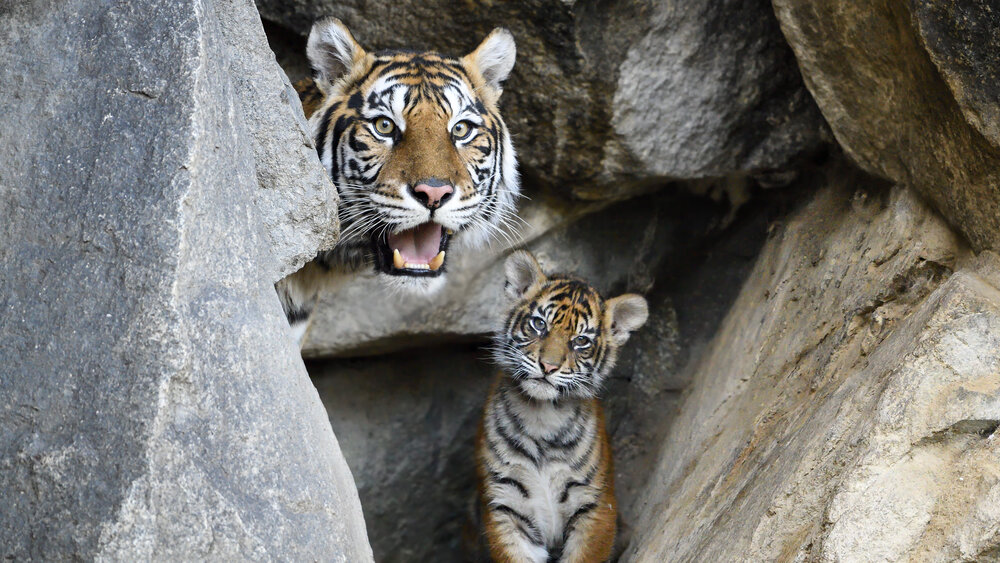
Sumatran tiger
Tierpark Berlin is working with the WWF to help protect the critically endangered Sumatran tiger.
Project facts
- Project partner
World Wildlife Fund (WWF)
- Species
Sumatran tiger (Panthera tigris sumatrae)
- IUCN threatened status
Critically Endangered (CR)
- Project location
Sumatra
- Greatest threats
Poaching and loss of habitat
- Response
Introducing anti-poaching measures and protecting habitats
Threat Categories of IUCN


Sumatran tigers in Berlin
Berlin’s first Sumatran tiger arrived way back in 1906. For many years now, Berlin’s zoos have been actively working to ensure the survival of the endangered big cats – with great success: between 1956 and 2020, 123 tiger cubs were born at the Tierpark alone. Those tigers have gone to other zoos around the world and continue to contribute to the preservation of the species with their own offspring.
More space and variety
The Tierpark’s historic Alfred Brehm building has been transformed into a themed Rainforest House. Members of the WWF’s Team Tiger Berlin initiative pitched in with renovating the Sumatran tigers’ outdoor habitats, which now fulfil modern requirements for the proper keeping of wild animals. Filling in the boundary ditches has given the tigers approximately twice as much surface area to roam. A large panoramic window now offers visitors a view of an inviting rocky pool for the cats to bathe in, while lush vegetation and landscaping modelled on their wild relatives’ lowland rainforest home provide the tigers with welcome retreats.
Habitat under threat
The Sumatran tiger is only found on the Indonesian island of Sumatra, making it the southernmost subspecies of tiger still alive today. The natural habitat of Sumatran tigers ranges from dense rainforests to swamps. Poaching for medicinal purposes has decimated the Sumatran tiger population. Habitat destruction through deforestation is also a major problem, and is leading to more and more conflicts with local people. In collaboration with the WWF, Tierpark Berlin is pursuing a variety of approaches to help protect the Sumatran tiger, which is threatened with extinction.
Anti-poaching measures and better law enforcement
To curb the illegal hunting of these tigers and their prey, the WWF trains national rangers and provides metal detectors to help them quickly locate dangerous snare traps. The WWF is also intensifying its cooperation with the police and other authorities to try to put a permanent stop to poaching and the organized crime behind it.
Stopping deforestation and preserving remaining tiger habitats
Our insatiable hunger for land to produce palm oil, rubber and paper shows no signs of abating. The WWF is therefore working to ensure that protected areas are better managed and are creating “green corridors” to connect them. One of its top priorities at the moment is to save one of the last remaining rainforests in central Sumatra. The Rimbang Baling landscape forms an important link between existing protected areas and is therefore essential for ensuring the genetic diversity of tiger populations.
Alternatives to poaching
Often, the main reason behind poaching is poverty. Tiger conservation therefore starts with the local human population. If people are doing well, they are less likely to get involved in seemingly lucrative poaching activities and are more open to tiger conservation efforts. The WWF works with local communities to implement concepts for sustainable forestry and plantation management, supports them in marketing their local products, and helps them develop ecotourism as a source of income.
Become a member of Berlin’s Tiger Team!
Support the WWF’s anti-poaching and conservation work and help save the last remaining tiger habitats in Sumatra. Become a member of "Team Tiger Berlin"!



